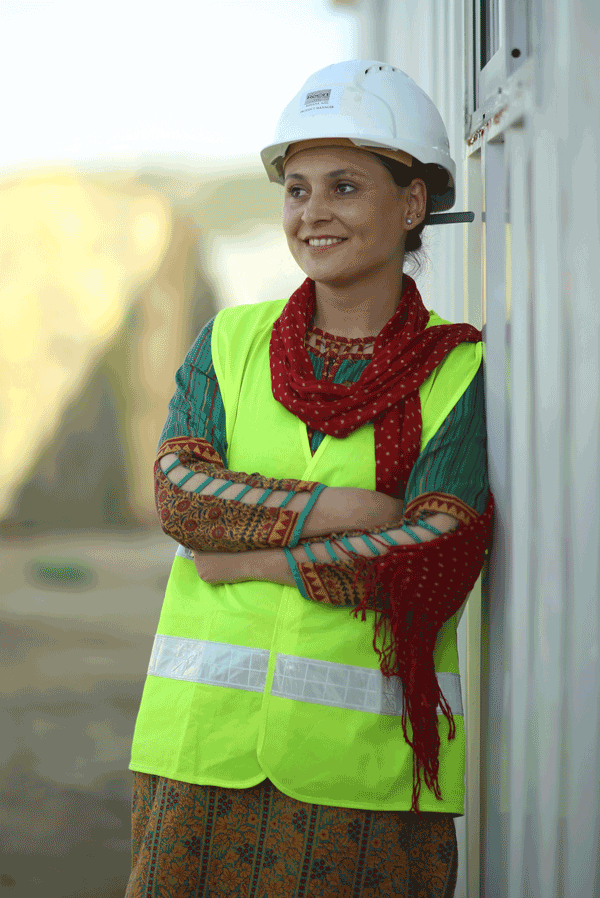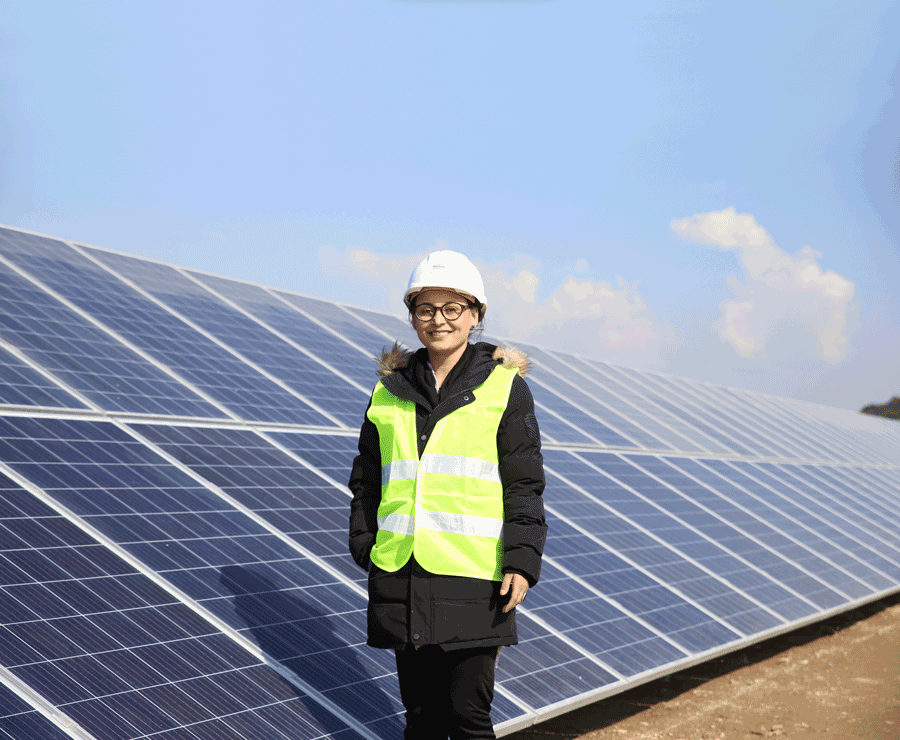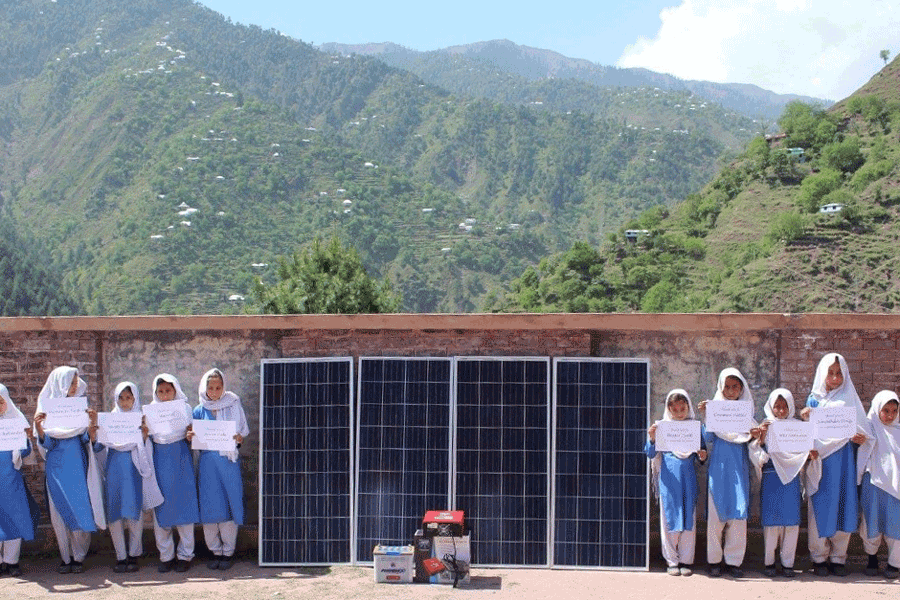Igniting a Spark
By Mahnoor M. Farooqui | Profile | Published 6 years ago
Leading female engineer in Renewable Energy, Rehana Aziz is on a mission to change Pakistan. In December 2013, she founded two major environmental awareness and climate change initiatives: RE (Renewable Energy) Journey Pakistan, and Pakistan’s Voice for Global Goals. These campaigns – just two of the several others she has been working on alongside — are aimed at promoting awareness about climate change and renewable energy among the youth, and helping pave the way for a shift towards environmentally-friendly energy resources.
 Aziz graduated from the National University of Science and Technology in Islamabad in the field of BE Electronics in 2012, where she discovered her passion for the energy sector and climate change. And in the short time since, she has built herself a meaningful career in a completely male-monopolised field. Her success in the field owes to her commitment: she works hard, investing her time liaising with major companies across Lahore and Islamabad. Aziz is currently working at REON Energy Pakistan Private Limited in Islamabad, where she has taken on even more challenging pursuits in the energy sector.
Aziz graduated from the National University of Science and Technology in Islamabad in the field of BE Electronics in 2012, where she discovered her passion for the energy sector and climate change. And in the short time since, she has built herself a meaningful career in a completely male-monopolised field. Her success in the field owes to her commitment: she works hard, investing her time liaising with major companies across Lahore and Islamabad. Aziz is currently working at REON Energy Pakistan Private Limited in Islamabad, where she has taken on even more challenging pursuits in the energy sector.
For RE Journey Pakistan, Aziz created a volunteer network, gathering around 25 volunteers from all over Pakistan, travelling and conducting awareness sessions in over 30 schools, beginning from Gilgit-Baltistan, to, apart from Kashmir, across the country, out of her own pocket. The RE Journey Pakistan team’s activities comprised choosing volunteers and student representatives from each school for the sessions, as they raised awareness on renewable energy.
In the process of their work-related travels across Pakistan, they held different interactive activities, where they prepared some questions on solar light – to increase knowledge of its effects and uses as a renewable source – to make students aware of the very real problem of climate change and potential solutions. This way, the campaign became a two-in-one initiative. Painstakingly, among their official work, Rehana Aziz and her team made and gave giveaways to the children they met, which included toys showing how solar light could power them, so they might realise the power of renewable energy.
Rehana Aziz’s Pakistan’s Voice for Global Goals has gone on to raise awareness among people on the role they can play to achieve energy targets and to implement sustainable development goals. They have held plantation drives across the provinces, such as in Kohat, using Facebook and LinkedIn to present their events to the public and involve them at the most direct level, creating an environment of responsibility.
The very real gender gap in the energy field was not, however, something Aziz could overlook. The major stake and point of focus of her newest work has been SHE in Energy, SHE in Business. Having worked in a myriad energy companies with barely any female staff, having faced security concerns when engaged in projects in the more remote areas, and dealing with blocks to her travel, she urgently felt the need for a greater community of women in the field — female advocates to provide encouragement and guidance to those interested in the energy sector, while creating a proper network through which women professionals in this sector in Pakistan could meet.
To this end, Aziz conducted one-on-one mentorship programmes and held conferences. She would talk to executives, and spar with higher management, discussing the role and place of women in the renewable energy field. “ Along the way, this became a personal goal. And two or three women still contact me every month for mentorship regarding their careers. It was a voluntary role I took on outside of my job, and will continue to do it for as long as I can,” said Aziz.

The energy journey is, of course, an ongoing one.
Having grown up in Gilgit, Aziz was privy to the effect of the area’s isolation from Pakistan’s national power grid. Growing up for the most part with the lack of a basic need such as electricity, was what ignited the fire that led her to pursure a career in accessible, renewable energy. And so, she set out to change this issue too. Towards the end of 2017, Rehana began work on collecting donations and funds through a Go Fund Me online account, to help bring solar energy to schools in Pakistan. It took around eight months to put together Rs. 1 lakh. She used social media to hold a poll, asking which schools would like to be solarised.
Said Aziz, “We received around eight to ten applications. One of these was an all- girls government school in Muzaffarabad. It took around four months to collect donations and complete the project. The school had seven rooms, with very heavy wattage lights and fans placed in them. The CFL lights were replaced with LED lights, and the heavy watt fans with lighter fans. So essentially, we converted the school into an energy-efficient load.”
While the components she uses in her projects are imported, Aziz has designed the system from scratch, and says upkeep and maintenance are very simple. With the school staff and maintenance team trained for this purpose, the cleaning of the panels takes 5-10 minutes, and they send her frequent updates with pictures.
Surprisingly, Rehana Aziz does not wish to patent her movement, nor even the idea. Instead, sharing it willingly on social media, she hopes it will inspire people to copy her work or volunteer to join her campaign.
“People say we market our initiatives too much, but we want people to do the same things. We want them to know they too can do it,” said Aziz. She added, “The general feedback we got from communities, was the question, ‘why are you focusing on purely girl’s schools?’ The plan is to gradually target boy’s schools, but at this point, in the less developed areas, girls are not given access to many facilities. Initially, the focus was on inspiring and showing girls what they can do.”

While she has plans to equip another school soon with solar energy, she hopes to incorporate the work through company CSR activities, with corporate support, in the hope of creating a sustainable model to continue similar ventures.


